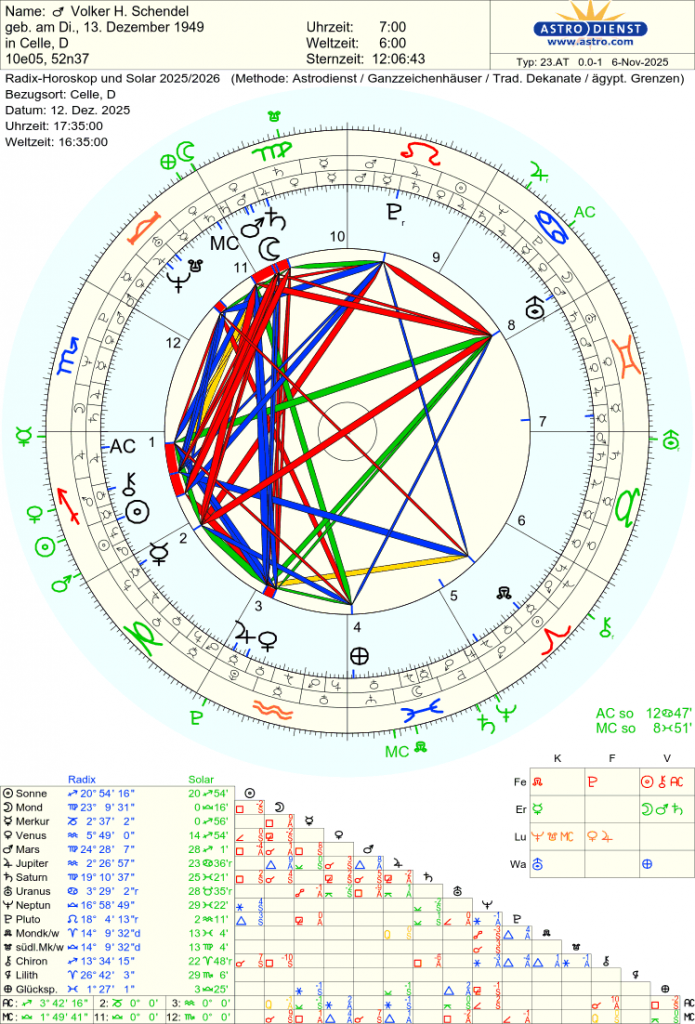Talk – Hannöversche Astrologie mit Privatdozent Dr. Gustav Adolf Schoener – Astrologie in der Religionsgeschichte – am 13. November 2025
Talk – https://talk.vonabisw.de/Astrologen3/Schoener.mp4
Bitchute – https://www.bitchute.com/channel/RLNyT9ETWzwa
Rumble – https://rumble.com/c/c-496224?e9s=src_v1_cbl
Youtube – https://www.youtube.com/@astrotalk-traditionelleast5306/videos
************************************
Biographisches – https://www.youtube.com/watch?v=oCPph7u6o6Q&list=PLCKPz4q3EX-sbfvXi-ARNe-tzDKjikFOx&index=2
2025 – Filmliste bei Astrotalk – https://www.youtube.com/playlist?list=PLCKPz4q3EX-sbfvXi-ARNe-tzDKjikFOx
Astrotalk Filmliste – https://www.youtube.com/playlist?list=PLqrXs5EoIK0mtsIj_wWwIvF9G15psGv_Q
PD Dr. Gustav Adolf Schoener – Astrology in European Religious History – Its Philosophical Foundations through the Ages – Leibniz Universität Hannover – https://astrologien.vonabisw.de/astrologien/pd-dr-gustav-adolf-schoener – https://astrotalk.vonabisw.de/astrology-in-european-religious-history-its-philosophical-foundations-through-the-ages
Philosophie des Hohenstein – https://www.youtube.com/playlist?list=PLCKPz4q3EX-s2T9HCu6OlnKj4XEVhjSVA
Talks
Astrologie in der Religionsgeschichte –https://talk.vonabisw.de/Schoener/Schoener1.mp4 –
Dr. habil. Gustav A. Schoener im Dialog Teil 1 – https://talk.vonabisw.de/Schoener/Schoener2.mp4 –
Dr. habil. Gustav Adolf Schoener im Dialog – Teil 2 – https://talk.vonabisw.de/Schoener/Schoener3.mp4
*************************************+
Gustav-Adolf Schoener promovierte am Institut für Philosophie der Leibniz Universität Hannover zum Doktor der Philosophie und habilitierte sich anschließend am Institut für Religionswissenschaft. Seine zentralen Forschungs- und Lehrschwerpunkte liegen auf Religionen, Weltanschauungen und Esoterik, wie sie sich in der Antike, der Frühen Neuzeit und der Moderne in der europäischen Religionsgeschichte zeigen. Darüber hinaus war er Sprachlehrer für Latein und Altgriechisch am Institut für Theologie der Leibniz Universität.
Astrologie in der Europäischen Religionsgeschichte – Kontinuität und Diskontinuität – Dr. habil. Gustav Adolf Schoener – https://www.amazon.de/-/en/Gustav-Adolf-Schoener-ebook/dp/B076F9TKGC/ref=sr_1_1?dchild=1&keywords=Astrologie+in+der+Europäischen+Religionsgeschichte&qid=1615553424&sr=8-1
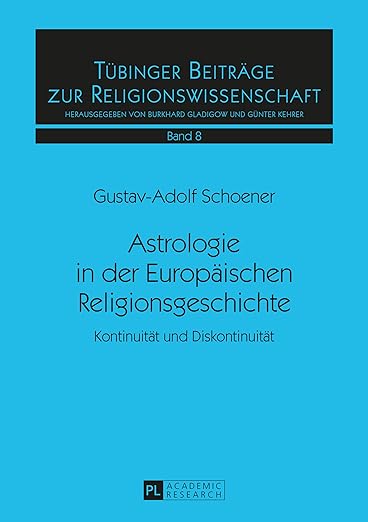
–https://www.peterlang.com/document/1306703
Astrologie in der europäischen Religionsgeschichte: Ihre philosophischen Grundlagen im Lauf der Jahrhunderte – Diese religionswissenschaftliche Abhandlung zeichnet die europäische Tradition der Astrologie von ihren orientalischen Ursprüngen bis in die Gegenwart nach. Ziel ist es, die unterschiedlichen mythologischen, philosophischen und theologischen Vorstellungen vom Kosmos zu betrachten, die die Astrologie immer wieder aufgegriffen, umgeformt und durch alle Epochen hindurchgetragen hat, insbesondere mit platonischen und aristotelischen Einflüssen. Zwar scheint es, als habe die Astrologie mit der Überwindung des geozentrischen Weltbildes durch Kopernikus und Kepler ihre Plausibilität verloren und könne nur noch als eine „intellektuelle Regression“ (Theodor Adorno) fortbestehen. Dieser Sichtweise wird jedoch die hier begründete These entgegengesetzt, dass die Astrologie die Veränderungen der Weltbilder unbeschadet überstanden habe, da sie philosophische, ganzheitliche Denkmuster für das Verhältnis von Kosmos und Mensch entwirft, die im platonischen Sinn den Kosmos als intelligentes und lebendiges Organismuswesen verstehen.
**************************************
Astrology in European Religious History: Its Philosophical Foundations through the Ages –
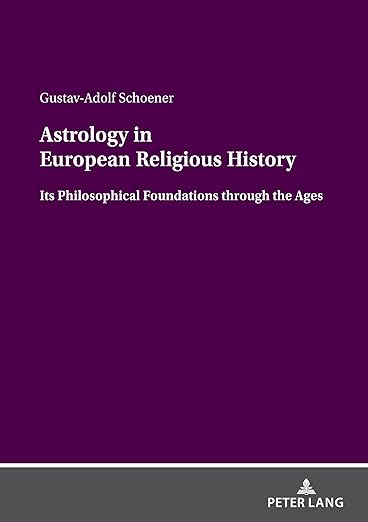
**************************************
Filmlisten
Filmliste – https://www.youtube.com/playlist?list=PLCKPz4q3EX-sSeDNPpzSLXK29biktNKMj
Filmliste – https://www.youtube.com/playlist?list=PLqrXs5EoIK0mtsIj_wWwIvF9G15psGv_Q
***************************************
Biographie von PD Dr. Schoener
bis 1984 – Studium der evangelischen Theologie in Berlin
bis 1994 – Studium der Geschichte und Philosophie – Promotion zum Dr. phil.
Tätigkeiten in der Jugend- und Erwachsenenbildung
1996-2020 – Tätigkeiten am Institut für Religionswissenschaft (u.a. Lehrkraft für besondere Aufgaben) und am Institut für Theologie der Leibniz Universität Hannover.
Astrologie seit 1990
Habilitiert mit „Astrologie in der Europäischen Religionsgeschichte. – Kontinuität und Diskontinuität“ –2016 publiziert – Antrittsvorlesung am 20. Juni 2016
***************************
Copyright
Volker H. Schendel hat nur das Recht, das Gespräch ungekürzt und unbearbeitet auf frei zugänglichen Videoplattformen (also keine Bezahlschranken) und auf seinen Homepages zu veröffentlichen. – Unser Gast hat das Recht, die mp4-Datei beliebig zu kürzen, bearbeiten oder zu ergänzen und auf seinen Internetangebotsseiten parallel zu veröffentlichen.
***********************************
Referenzradix
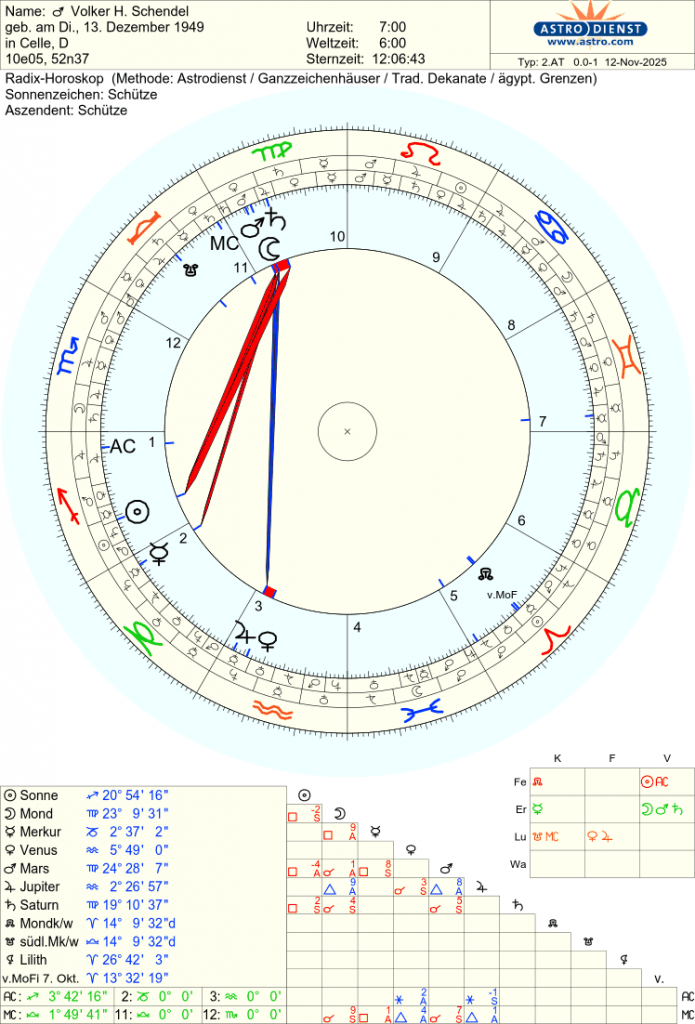
*****
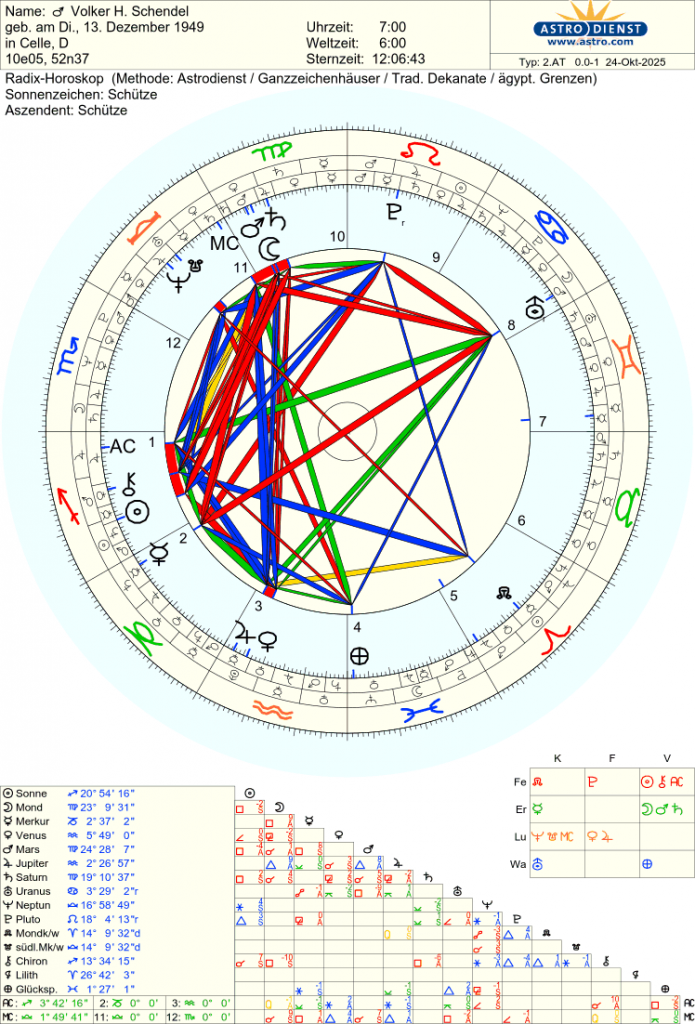
*13. Dezember 1949 – Celle – 7:00:00 a.m.
Aszendent: 3°42′ Schütze (1. Haus), Dodekatemoria: Steinbock – Merkur Dekanat – Jupiter Grenze
Medium Coeli (MC): 1°49′ Waage (10. Haus), Dodekatemoria: Waage – Mond Dekanat – Saturn Grenze
Sonne: 20°54′ Schütze (1. Haus), Dodekatemoria: Löwe – Saturn Dekanat – Merkur Grenze
Mond: 23°09′ Jungfrau (10. Haus), Dodekatemoria: Zwillinge, 11. Mondhaus nach Hofman – Merkur Dekanat – Mars Grenze
Merkur: 2°37′ Steinbock (2. Haus), Dodekatemoria: Wassermann – Dekanat Jupiter – Merkur Grenze
Venus: 5°49′ Wassermann (3. Haus), Dodekatemoria: Widder – Dekanat Venus – Merkur Grenze
Mars: 24°28′ Jungfrau (10. Haus), Dodekatemoria: Zwillinge – Dekanat Merkur – Mars Grenze
Jupiter: 2°26′ Wassermann (3. Haus), Dodekatemoria: Wassermann – Dekanat Venus – Merkur Grenze
Saturn: 19°10′ Jungfrau (10. Haus), Dodekatemoria: Widder – Dekanat Venus – Jupiter Grenze
Uranus: 3°29′ Krebs (rückläufig, 8. Haus), Dodekatemoria: Löwe – Dekanat Venus – Mars Grenze
Neptun: 16°58′ Waage (11. Haus), Dodekatemoria: Widder – Dekanat Saturn – Jupiter Grenze
Pluto: 18°04′ Löwe (rückläufig, 9. Haus), Dodekatemoria: Fische – Dekanat Jupiter – Merkur Grenze
Mondknoten (nördlich – wahr): 14°09′32“ Widder (5. Haus), Dodekatemoria: Jungfrau – Dekanat Sonne – Merkur Grenze**
Mondknoten (südlich – wahr): 14°09′32“ Waage – 11. Haus – Dodecatemoria Fische – Dekanat Saturn – Jupiter Grenze
Chiron: 13°34′ Schütze (1. Haus), Dodekatemoria: Stier – Dekanat Widder – Venus Grenze
Lilith (wahre schwarze Mond): 26°42′ Widder (5. Haus), Dodekatemoria: Wassermann – Dekanat Venus – Saturn Grenze
Glückspunkt: 1°27′1″ Fische, Dodekatemoria: Fische – Dekanat Saturn – Venus Grenze
Schicksalspunkt (Lot of Spirit): 5°57′10″ Jungfrau, Dodekatemoria: Skorpion – Dekanat Sonne – Merkur Grenze
Dodecatemoria
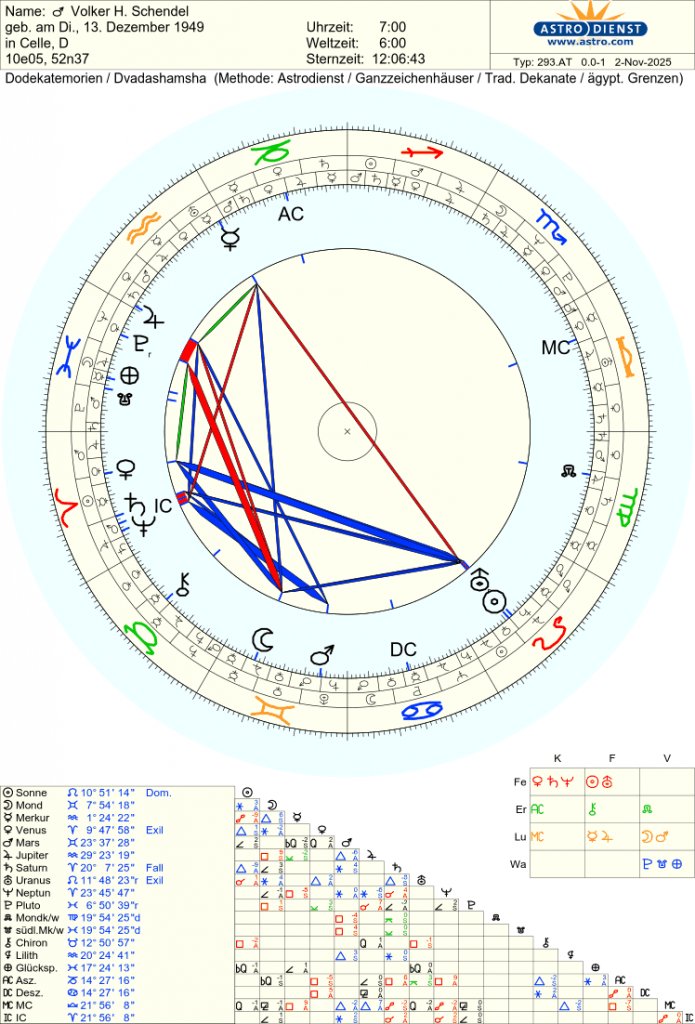
Gradqualitäten
Fixsterne
https://astrologien.vonabisw.de/astrologien/fixsterne
Der Mond im 11. Arabischen Mondhaus Al-Zubrah
Al-Zubrah gilt als glücklich (saʿd) unter den 15 positiven Mondhäusern (von 28 insgesamt)
Die erdige, analytische Jungfrau-Energie des Mondes – präzise, dienstorientiert und detailverliebt – wird von Al-Zubrahs feuriger, charismatischer Löwen-Mähne aufgeladen, was emotionale Stärke mit praktischer Präzision verbindet. Im 10. Haus (Karriere, öffentliches Ansehen, Autorität) manifestiert sich das als tiefes Bedürfnis nach Anerkennung durch Leistung und soziale Führung: Emotionen sind karriereabhängig – berufliche Erfolge füttern das Seelenleben, und Al-Zubrah verleiht hier einen Glanz durch mutige, visionäre Rollen. s.a. https://astrologien.vonabisw.de/astrologien/nativitas
Astrocartographie
https://astrologien.vonabisw.de/astrologien/orte-astrologie
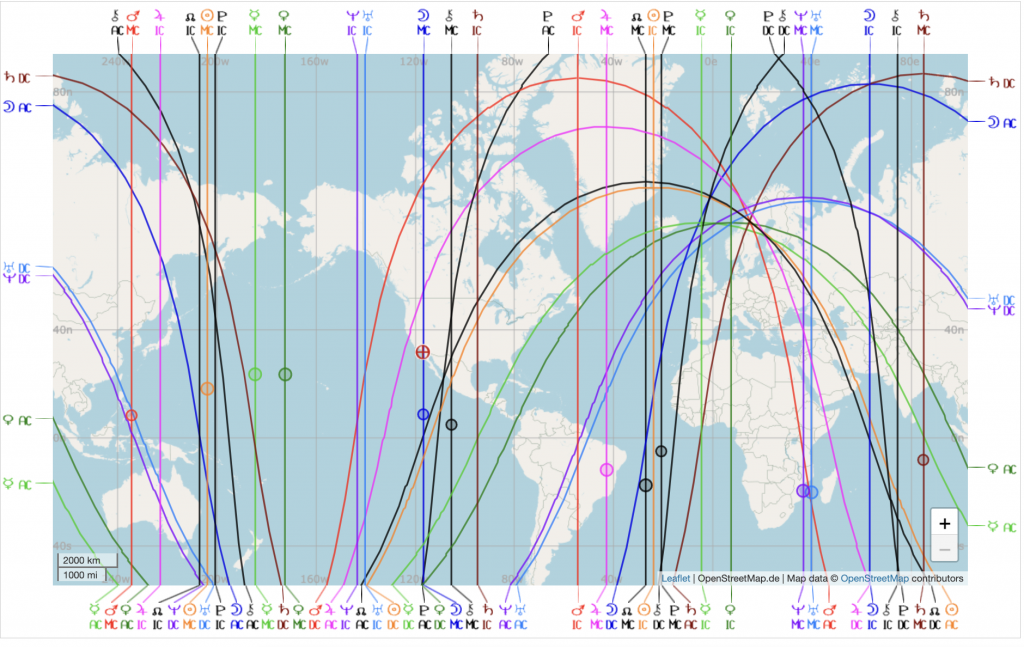
Für 6. November 2025
Transite und Progressionen
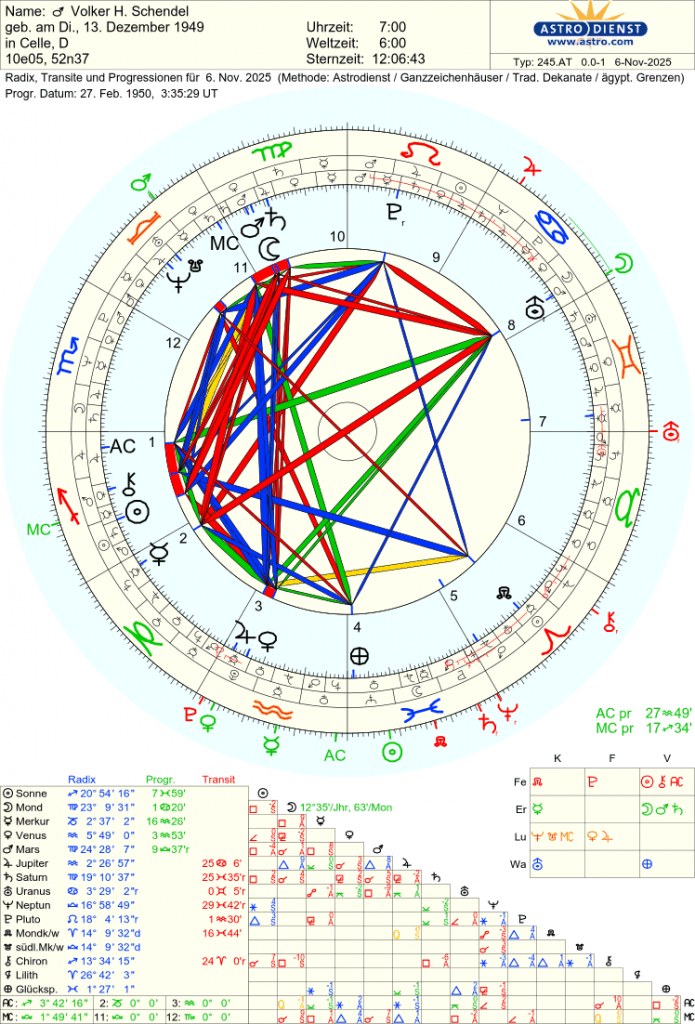
Progressionen wie Radix
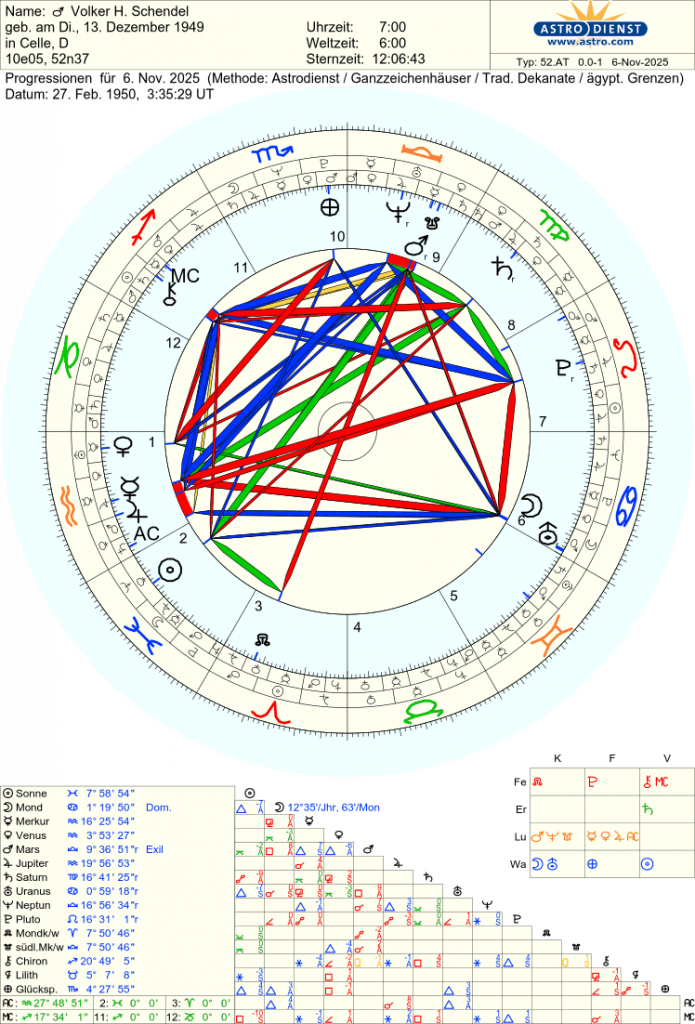
Sonnenbogendirektionen
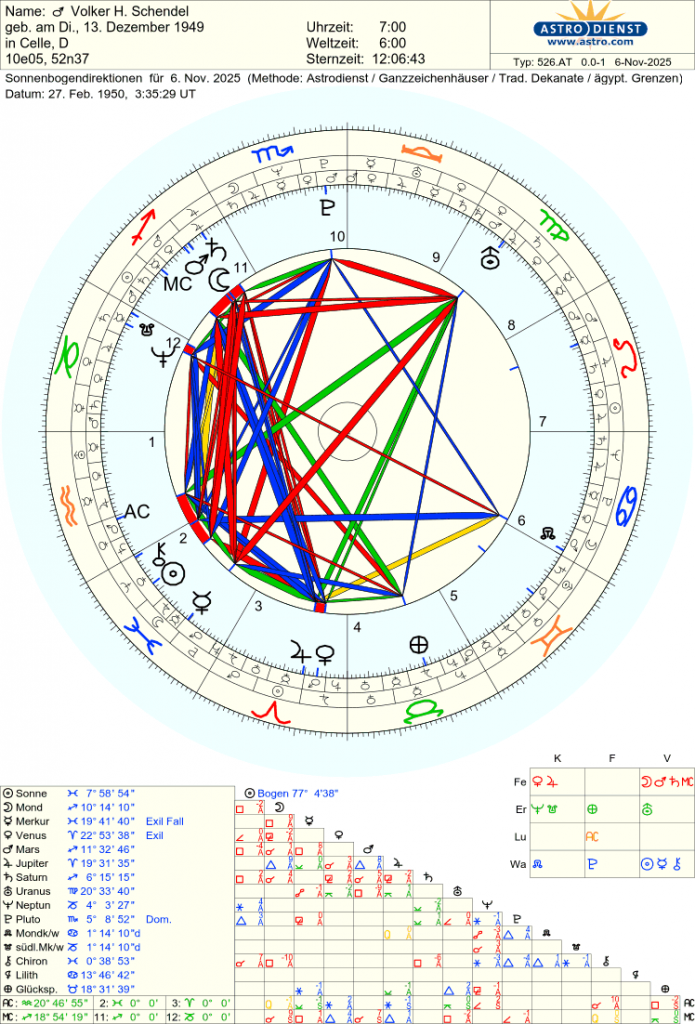
Radix mit Sonnenbogendirektionen
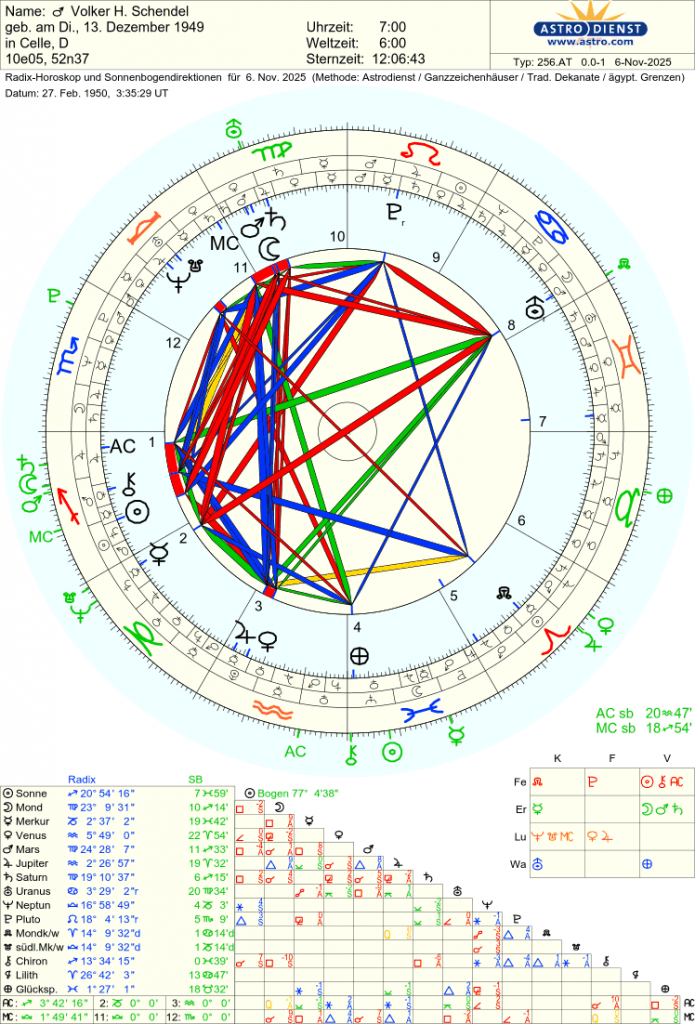
Solar 2025/2026
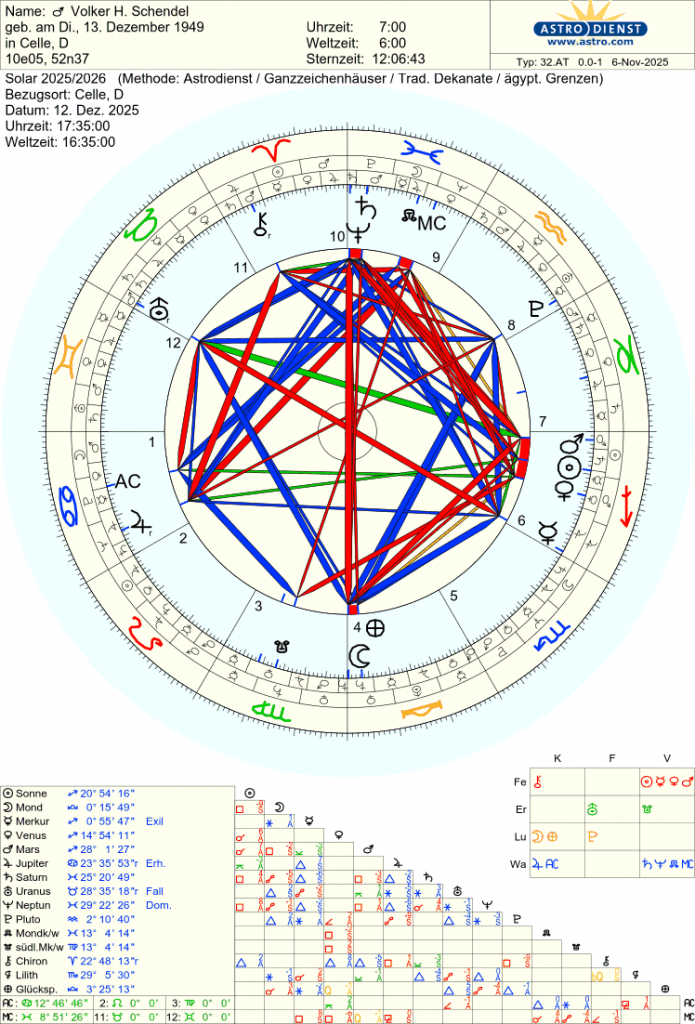
Solar im Außenkreis
